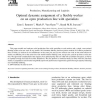Free Online Productivity Tools
i2Speak
i2Symbol
i2OCR
iTex2Img
iWeb2Print
iWeb2Shot
i2Type
iPdf2Split
iPdf2Merge
i2Bopomofo
i2Arabic
i2Style
i2Image
i2PDF
iLatex2Rtf
Sci2ools
EOR
2006
2006
Optimal dynamic assignment of a flexible worker on an open production line with specialists
This paper models and analyzes serial production lines with specialists at each station and a single, cross-trained floating worker who can work at any station. We formulate Markov decision process models of K-station production lines in which (1) workers do not collaborate on the same job, and (2) two workers can work at the same task/workstation on different jobs at the same time. Our model includes holding costs, set-up costs, and set-up times at each station. We rigorously compute finite state regions of an optimal policy that are valid with an infinite state space, as well as an optimal average cost and the worker utilizations. We also perform a numerical study for lines with two and three station. Computations and bounds insightfully expose the performance opportunity gained through capacity balancing and variability buffering.
| Added | 12 Dec 2010 |
| Updated | 12 Dec 2010 |
| Type | Journal |
| Year | 2006 |
| Where | EOR |
| Authors | Linn I. Sennott, Mark P. Van Oyen, Seyed M. R. Iravani |
Comments (0)

